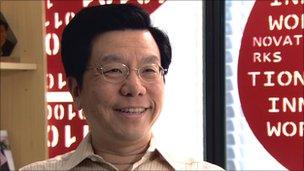Lee Kai-Fu: Microblogs 'revolutionising Chinese media'
- Published

The ex-head of Google in China says he is willing to accept government censorship
Microblogging has led to a revolution in the way people communicate with each other in China, according to internet guru Lee Kai-Fu.
The implications of this social movement are immense. Mr Lee said it is forcing the Chinese Communist Party to look at how it governs the country.
He should know. He has worked for perhaps the world's three biggest technology companies: Apple, Microsoft and Google.
More than 8m people follow his own microblog - daily titbits posted on Weibo, China's most popular site.
He has also written a book on this phenomenon, called Microblog: Changing the World, a title that neatly encapsulating his views on this issue.
'Bad things exposed'
"Microblogging leverages the wisdom of the crowds. The good things get forwarded, or re-tweeted, and bubble up to the top," he said in an interview with the Â鶹ԼÅÄ.
"It's really revolutionising the media and how they spend time online here in China."
Mr Lee spends about one-and-a-half hours a day updating his own microblog.
"I'm able to use fragments of time when I'm waiting for someone or I'm in the car," said the blogger, who writes about all kinds of topics, including his family.
But microblogs in China are not just about trivia.
Mr Lee said there are now people who do not bother logging onto news websites to find out what is going on in the world - they use microblogs instead.
One major consequence of this revolution has been that people can now get access to information that was previously controlled by the party.
The internet also gives them a public forum to speak out.
It is not a point Mr Lee wants to push too far, but he admits: "People's ability to express unhappiness about things - corrupt government officials, being treated unfairly at work - all of these bad things are being exposed."
'Something to ponder'
These developments have made China's communist leaders nervous because they fear it could threaten their ability to rule this populous nation.
They are trying to control microblogs - as they do with the internet generally. But this is not a subject Mr Lee is entirely comfortable discussing.
Perhaps that has something to do with the fact that he still works in China.
His Beijing-based company, Innovation Works, invests in companies devising new ways to harness the internet.
The former head of Google in China declined to answer a question about how officials forced the US internet firm to censor its Chinese website.
"That's not something I can really talk about," he said.
But he made it clear that he was willing to accept government censorship.
"I, as an individual, want to bring the most advanced technologies and the greatest legal access to information that I can to every user of my products," he said.
"If accepting some law is a requirement to make that goal possible, I have no issues with accepting that law."
Lee Kai-Fu is also cautious about answering questions on how this communication revolution will change the way China is governed.
"[Microblogging] will at least accelerate the government leaders' thinking about the rate at which people are disseminating information, showing their voices," he said.
But he admits this is building up pressure for change.
"That acceleration will cause them to ponder. Whether they end up evolving, or make big changes or do nothing - that's not for me to speculate."
- Published17 February 2011
- Published4 January 2011
- Published2 November 2010